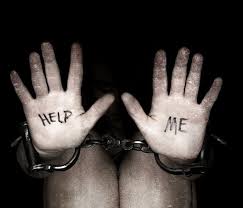
“There may be times when we are powerless to prevent injustice, but there must never be a time when we fail to protest.”
Elie Wiesel, Professor, Holocaust Survivor, Nobel Laureate
And sometimes protesting an issue involves taking huge steps and lots of concentrated action. Combating Human Trafficking is an issue that requires collaborative and concentrated action.
Here are some statistics from the first part of this three part blog.
- Every 60 seconds a person is bought, sold or forced into slavery. (U.S. Department of health and Human Services)
- Human trafficking is the second largest and fastest growing criminal enterprise in the world. (U.S. Department of State)
- Human Traffickers make an estimated $32 billion dollars annually. (United Nations Office on Drugs and Crime, UNODC)
- An estimated 20.9 million children, women and men worldwide are trafficked for commercial sex or forced labor. (UNODC)
- As many as 17,500 foreign nationals are believed to be trafficked into the United States each year, with almost 9,000 (50%) of those victims being children. (U.S. Department of Justice)
- An estimated 100,000 children, who are U.S. citizens, are victims of trafficking within the United States (U.S. Department of Justice).
- An estimated 82% of human trafficking cases are classified as sex trafficking (U.S. Department of Justice).
- An estimated 12,000 (83%) of sex trafficking involves U.S. citizens and almost 5,000 (40%) of those cases involved the sexual exploitation or prostitution of a child. (Congressional Research Service
- The average age of entry into prostitution by a trafficker is 13. (U.S. Department of Justice)
- Approximately 300,00 children nationwide are at risk of sexual exploitation; and of the close to 1.5 million runaway children, about 500,000 (1/3) will have some experience with prostitution. (U.S. News and world report)
- An estimated 70% child trafficking victims are sold online (United Nations Office on Drugs and Crime)
Since 2011, in response to this enormous problem, a nationwide sex-trafficking sting was developed called “National Day of Johns.” This yearly operation surrounds heavily attended events like the Super Bowl. It’s really about supply and demand. As the amount of sex buyers or “Johns” increase so do the amount of sex trafficking victims. While several studies examining online sex purchasing indicate the market is driven more by local demand, in every city, every day, the Super Bowl draws so many spectators that some have called it the largest trafficking event in the country. Each year, more arrests are made and more victims, many that are underage, are rescued. Last year, from January 15 to February 1, culminating on the day of the Super Bowl, nearly 70 law enforcement agencies in 17 states arrested 570 would be sex buyers (johns), 23 men, commonly called sex traffickers, and rescued 68 victims of human trafficking.
In addition to sex trafficking stings, most states have developed human trafficking task forces to: Help law enforcement fully understand the scope of the problem, develop laws that hold traffickers and sex buyers of trafficked victims accountable through prosecution, mobilize communities to care for victims and develop campaigns for public awareness and advocacy.
Finally, there are individuals, many who are survivors of human trafficking, who are protesting this problem by making a difference. One such individual is Theresa Flores. She was a high school sophomore from an affluent family in Birmingham, Michigan in the 1980’s. Theresa was trafficked, physical tortured and emotional abused for two years.
As a survivor she recently started a program called S.O.A.P. (save our adolescents from prostitution). Bars of soap are wrapped in labels That feature the National Human Trafficking Hotline number and asks “Are you being forced to do anything you don’t want to do?”. Her program volunteers then take these bars of soap to motels (many that rent by the hour), strip clubs and other spots where trafficking victims may taken. She hopes that the toll free number and message on the soap bars may help make a difference.
Here is Theresa Flores’s story
Sometimes even the smallest protest can help prevent injustice. As Physicist and Nobel Laureate, Albert Einstein said.
“The world is a dangerous place, not because of those who do evil, but because of those who look on and do nothing.”
If you like this post please share it.
